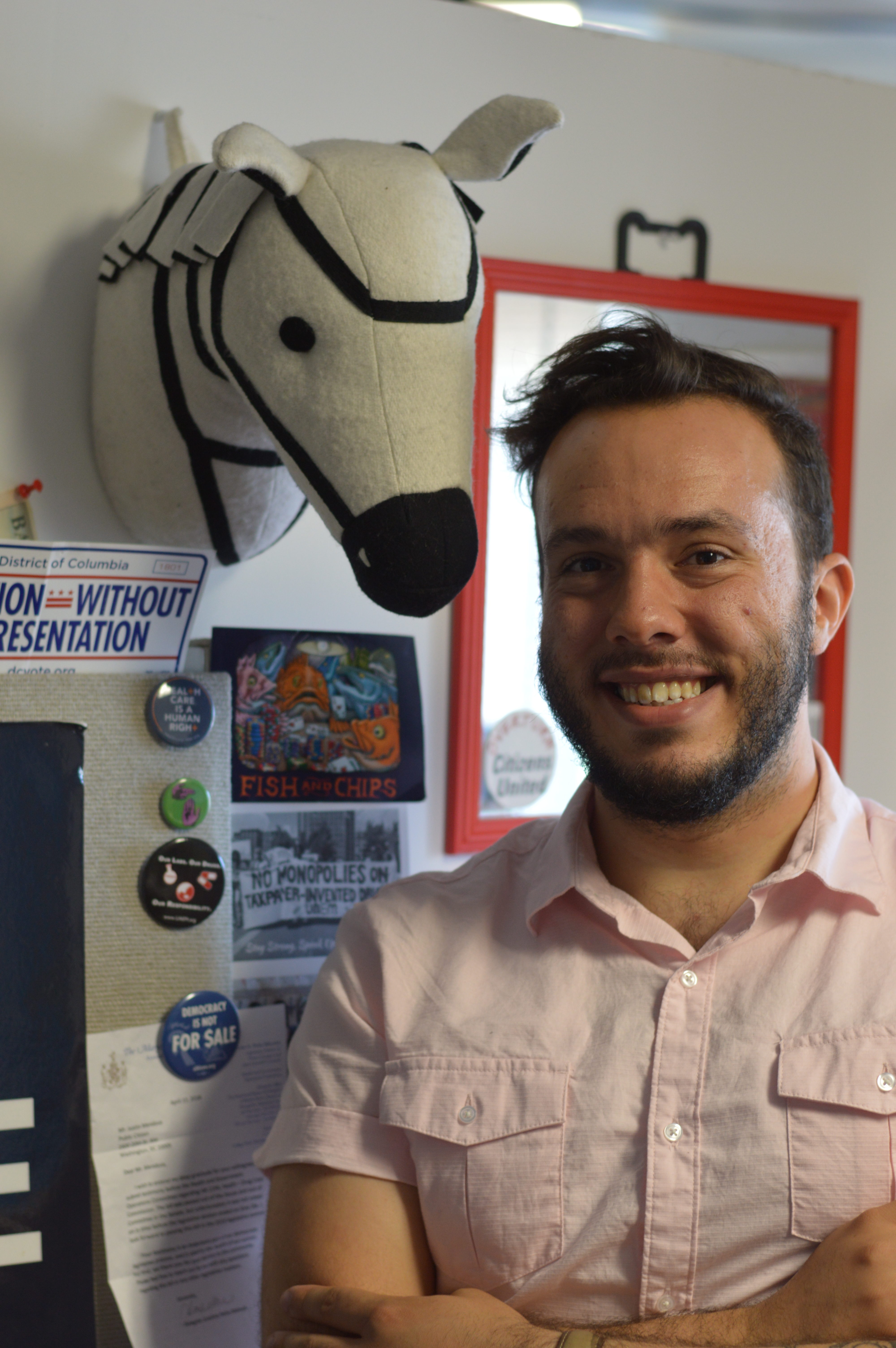Get to Know Justin Mendoza
By Ellida Parker

What do an octopus, compass and world map have to do with smart advocacy? Just ask Justin Mendoza, the organizer for Public Citizen’s Access to Medicines program, who works at Public Citizen to build the national movement for affordable medicines and fight the influence of pharmaceutical companies on Capitol Hill. Mendoza, whose advocacy is rooted in childhood experiences, has tattoos of an octopus and of a compass over a world map on his arms, with the tip of South America flipped upside down. For Mendoza, the inverted map and compass remind him to consider multiple perspectives while the octopus symbolizes the need to be flexible. The reminders came in handy this summer when Mendoza organized the Affordable Medicines Now conference, which brought more than 150 attendees and 60 speakers from across the country for three days of panels and workshops designed to expand the movement for affordable medicines.
Before joining Public Citizen in 2017, Mendoza worked as a community organizer and policy analyst at Partners in Health, an international health organization that aims to provide medical care to communities that need it most. Mendoza received a bachelor’s degree from Central Michigan University in biomedical sciences and neuroscience as well as a master’s degree from Yale University in health policy and regulatory affairs. He is a member of the board of directors for Universities Allied for Essential Medicines, a network of college students who strive to make universities and publicly funded research institutions part of the solution to the global access to medicines crisis.
Q: Tell us about your role at Public Citizen.
Mendoza: As the organizer for Public Citizen’s Access to Medicines team, I spend a lot of my time building new partnerships for Public Citizen, maintaining existing relationships and trying to get the message out that drug pricing is one of the health care reforms that should happen right now. Unions are incredibly pivotal to any health care fight, so I’ve been working hard to get more of the labor unions in on the same kind of work we do. I’ve also been trying to get more of the faith community to jump on board with the access to medicines issue.
My role also includes a bit of our own grassroots mobilization. Public Citizen has nearly 500,000 members and supporters, some of whom especially want to support work to lower drug prices, so I do a lot of digital engagement with them, to sign petitions, call their members of Congress and even come in person for things like our Affordable Medicines Now conference. I find the stories that will move people to dive in and take action.
Q: What does your typical day at Public Citizen consist of?
Mendoza: A typical day entails scouring the news for issues around drug pricing, from seeing the Trump administration fail yet again to address this issue (or else side with the pharmaceutical industry) to looking for new information we can respond to, either in the media or emails or through one-on-one conversations. A day might also include organizing a group of nonprofit leaders here in Washington, D.C., or putting together an online training session for grassroots members. I also run our initiative on state drug pricing policies, so a typical day might include diving into a new bill that’s being introduced on a state level and figuring out if we can support it.
Q: What led you to health policy work?
Mendoza: I grew up in Michigan in a working-class family. My father worked on the factory floor for a generic drug manufacturer, Perrigo, for 17 years when I was younger. My mom worked as a baker and then in a school cafeteria. Throughout my adolescence, I saw us going through different phases when we either had good access to health care or didn’t. We never qualified for Medicaid, and before the Affordable Care Act expanded, there was not always an option if your employer didn’t provide insurance or if your parents didn’t quite work 40 hours. There were times when I saw my family deal with health care expenses either by paying them off monthly or by having an insurance plan that was pretty much garbage. That, and a general interest in science, drove me toward health care. In college I started getting involved with health care advocacy with a group called Universities Allied for Essential Medicines, which is now one of our allies in the work that we do. I interned here at Public Citizen in 2014 on the Access to Medicines team and worked on a couple of different projects, and that’s what sold me on the idea that this would be the place to do as much as I can to lower drug prices and fight back against pharmaceutical power.
Q: Which object in your office right now says the most about you, and why?
Mendoza: I have a stuffed animal – a zebra – on the wall! It’s up there just for the shock factor – just to have something totally wild and unexpected. I have a standing desk in the office because I like to not be sedentary all day. I have a million papers spread throughout my office because there’s so much turf to cover on drug pricing.
Q: What do you like to do outside of work?
Mendoza: Outside of work, I enjoy spending time outside (unless it’s a Washington, D.C., August, in which case inside is best). I like to snowboard, bike, go camping and swim. On the weekends you can find me at my apartment’s swimming pool or walking my dog. I’m also energized by interesting books and people involved with progressive movements, so I like to check out author talks and events around the city.